
Clinical Gastroenterology and Hepatology
Scope & Guideline
Bridging Science and Practice in Digestive Health
Introduction
Aims and Scopes
- Gastrointestinal Diseases and Disorders:
The journal focuses on various gastrointestinal diseases, including inflammatory bowel disease (IBD), irritable bowel syndrome (IBS), and gastrointestinal cancers, providing insights into their pathophysiology, diagnosis, and management. - Liver Disease Research:
A significant emphasis is placed on liver diseases, particularly those related to nonalcoholic fatty liver disease (NAFLD), hepatitis B and C, liver cirrhosis, and hepatocellular carcinoma, exploring novel treatment options and surveillance strategies. - Endoscopic Techniques and Innovations:
The journal highlights advancements in endoscopic procedures, including innovations in techniques like endoscopic submucosal dissection, peroral endoscopic myotomy, and the use of artificial intelligence in endoscopy. - Patient-Centered Care and Quality Improvement:
Research on patient outcomes, quality of care, and health disparities in gastrointestinal and liver diseases is a core focus, emphasizing the importance of patient-centered approaches and health equity. - Dietary and Lifestyle Interventions:
The journal also addresses the role of dietary therapies and lifestyle modifications in managing gastrointestinal and liver conditions, including the impact of diet on disease progression and symptom relief.
Trending and Emerging
- Artificial Intelligence in Gastroenterology:
There is a growing focus on the application of artificial intelligence (AI) in gastrointestinal diagnostics and treatment, particularly in enhancing endoscopic procedures and improving accuracy in disease detection. - Integrated Care Models:
Emerging research emphasizes integrated care models that combine gastroenterology with other specialties, addressing the multifaceted nature of gastrointestinal and liver diseases, particularly in patients with comorbidities. - Metabolic Dysfunction-Associated Fatty Liver Disease (MAFLD):
MAFLD is increasingly recognized as a significant health concern, leading to a surge in studies investigating its epidemiology, risk factors, and treatment options, reflecting a paradigm shift from the traditional NAFLD nomenclature. - Telemedicine and Remote Monitoring:
The COVID-19 pandemic has accelerated the adoption of telemedicine in gastroenterology, with ongoing research into its efficacy and patient satisfaction, indicating a potential long-term change in how care is delivered. - Patient-Centered Outcomes and Quality of Life:
Research is increasingly focusing on patient-reported outcomes and quality of life measures, acknowledging the importance of these factors in the management of chronic gastrointestinal and liver diseases.
Declining or Waning
- Traditional Pharmacological Treatments:
There is a noticeable decline in studies focusing solely on traditional pharmacological treatments, as the field shifts towards personalized medicine and biologic therapies that offer more targeted approaches to treatment. - Generalized Screening Practices:
Research on generalized screening practices for conditions like colorectal cancer has waned, with a shift towards risk-based and personalized screening strategies that consider individual patient factors. - Non-Invasive Testing for Liver Disease:
The frequency of studies centered around older non-invasive testing methods for liver disease has decreased, as newer, more accurate technologies and biomarkers are being developed and validated.
Similar Journals

Gastroenterology Insights
Unlocking New Perspectives in GastroenterologyGastroenterology Insights is a premier open-access journal published by MDPI since 2009, focusing on essential research and developments within the fields of gastroenterology and hepatology. With a dedicated ISSN of 2036-7414 and E-ISSN 2036-7422, this journal serves as a vital platform for disseminating innovative studies and insights pertinent to gastrointestinal health, disorders, and treatment modalities. Based in Switzerland, Gastroenterology Insights boasts a significant academic presence, currently positioned in the Q3 quartile for both gastroenterology and hepatology categories as of 2023, reflecting its impactful contributions to the disciplines. With Scopus rankings placing it at the 94th and 48th positions in gastroenterology and hepatology respectively, the journal is committed to advancing knowledge and fostering collaboration among researchers, professionals, and students alike. By providing an open-access model, it ensures that high-quality research is accessible globally, thereby enhancing the reach and impact of crucial findings in the science of digestive health. Researchers looking to publish cutting-edge work will find Gastroenterology Insights a valuable resource for both sharing and acquiring knowledge.

Translational Gastroenterology and Hepatology
Fostering Global Collaboration in Gastrointestinal Science.Translational Gastroenterology and Hepatology, published by AME Publishing Company, stands as a pivotal platform for advancing the understanding and treatment of gastrointestinal and liver diseases. With its focus on translational research, this journal aims to bridge the gap between laboratory discoveries and clinical applications, thus fostering improvements in patient care. Although specific metrics like H-Index and Scopus ranks are currently unavailable, the journal is committed to maintaining high standards of scholarly communication and excellence. As an open-access publication, it ensures that valuable findings are readily accessible to a global audience, promoting collaboration and innovation among researchers, clinicians, and healthcare professionals invested in gastroenterology and hepatology. The journal's dedication to disseminating groundbreaking research makes it an essential resource for those seeking to stay at the forefront of these ever-evolving fields.
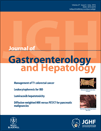
JOURNAL OF GASTROENTEROLOGY AND HEPATOLOGY
Innovative insights into digestive and liver health.Welcome to the JOURNAL OF GASTROENTEROLOGY AND HEPATOLOGY, an esteemed publication in the field of gastroenterology and hepatology, proudly published by WILEY. Established in 1986, this journal serves as a crucial platform for researchers, healthcare professionals, and students, presenting groundbreaking research and comprehensive reviews that drive advances in understanding and treating gastrointestinal and liver diseases. With a strong reputation evidenced by its Q1 ranking in gastroenterology and Q2 ranking in hepatology, this journal ranks impressively in the Scopus metrics - positioned at #22 out of 167 in gastroenterology and #21 out of 82 in hepatology, reflecting its contribution to scholarly excellence. Although it does not offer open access options, the journal’s rich archive and diverse topics make it indispensable for those dedicated to improving patient outcomes in these critical areas of medicine. Whether you are a seasoned researcher or an aspiring medical professional, engaging with this journal will keep you at the forefront of the latest developments and emerging trends in gastroenterology and hepatology research.

Gastroenterology
Elevating Knowledge in Gastroenterology and HepatologyGastroenterology, published by W B Saunders Co-Elsevier Inc, is a premier journal dedicated to advancing the knowledge and practice within the fields of gastroenterology and hepatology. Established in 1945 and covering a wide range of topics related to digestive health, this journal holds a distinguished position in the academic community, as evidenced by its impressive Q1 status in both Gastroenterology and Hepatology categories, and its high rankings (4th in both disciplines) in Scopus, placing it in the top percentile for scholarly impact. With its commitment to publishing high-quality research, reviews, and clinical studies, Gastroenterology provides an essential resource for researchers, healthcare professionals, and students seeking cutting-edge insights that inform clinical practices and enhance patient care. Although it does not currently offer open access, the journal continues to serve as a vital platform for disseminating meaningful research that shapes the future of digestive disease management.
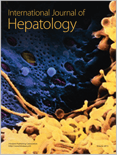
International Journal of Hepatology
Empowering global knowledge in liver health.The International Journal of Hepatology, published by HINDAWI LTD, is a premier open-access journal dedicated to the field of hepatology. Since its inception, this journal has championed the dissemination of cutting-edge research and reviews pertaining to liver health, diseases, and therapies. With an ISSN of 2090-3448, the journal has been committed to open-access publishing since 2011, ensuring that vital knowledge is readily available to researchers, clinicians, and students worldwide. Based in Egypt, this journal stands out in its category, achieving a Q3 ranking in 2023 within the scope of Hepatology by Scopus, which ranks it #43 out of 82 in the field. The International Journal of Hepatology offers a platform for significant findings and discussions that influence clinical practices and foster new research directions, thus playing a crucial role in advancing the understanding of liver diseases and their management.
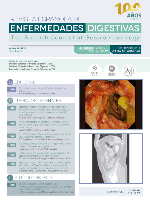
REVISTA ESPANOLA DE ENFERMEDADES DIGESTIVAS
Connecting researchers and clinicians for better outcomes.REVISTA ESPANOLA DE ENFERMEDADES DIGESTIVAS, a pivotal Open Access journal published by ARAN EDICIONES, S A, has been at the forefront of advancing the field of gastroenterology since its inception in 1990. With a robust commitment to disseminating high-quality research, the journal provides a platform for researchers, clinicians, and students to share innovative findings and insights concerning digestive diseases. The journal is characterized by its Q3 ranking in both Gastroenterology and Miscellaneous Medicine categories, indicative of its significant contributions to these fields, and is positioned within the 36th percentile of Scopus rankings for medicine related to gastroenterology. Based in Spain, REVISTA ESPANOLA DE ENFERMEDADES DIGESTIVAS has embraced the Open Access model since 2004, ensuring that its articles are readily available to a global audience without financial barriers. The journal not only supports academic discourse but also plays a crucial role in improving clinical practices and health outcomes related to digestive health.

Frontline Gastroenterology
Innovating Insights in Gastrointestinal HealthFrontline Gastroenterology is a leading academic journal published by the BMJ Publishing Group that plays a vital role in advancing the field of gastroenterology and hepatology. Established in 2013, this prestigious journal has established itself as a significant resource for researchers, healthcare professionals, and students alike, maintaining a commendable impact factor and consistently achieving a Q2 ranking in both gastroenterology and hepatology categories as of 2023. With its focus on disseminating high-quality, peer-reviewed research, Frontline Gastroenterology covers a wide scope of topics pertinent to the understanding, diagnosis, and treatment of gastrointestinal and liver diseases. Although it does not offer Open Access options, its content is accessible through various institutional and personal subscriptions, ensuring that critical findings reach an international audience. As the journal continues to converge into the future, it remains dedicated to fostering innovation and dialogue in gastroenterological sciences.
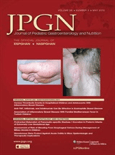
JOURNAL OF PEDIATRIC GASTROENTEROLOGY AND NUTRITION
Uncovering solutions for digestive health in children.Journal of Pediatric Gastroenterology and Nutrition is a premier academic journal published by Wiley, focusing on the critical intersection of pediatric gastroenterology and nutrition. Established in 1982, this journal has been at the forefront of research and clinical practices for over four decades and continues to contribute invaluable insights to the fields of pediatrics and gastrointestinal health, boasting a Q1 ranking in Pediatrics, Perinatology and Child Health and a Q2 ranking in Gastroenterology as of 2023. The journal features a comprehensive array of original research, review articles, and clinical studies aimed at improving the understanding and management of pediatric gastrointestinal disorders and nutrient imbalances. Edited with expertise, the Journal of Pediatric Gastroenterology and Nutrition serves as an essential resource for clinicians, researchers, and students dedicated to advancing the well-being of children with digestive health issues. Readers can access the journal's impactful research studies through traditional subscriptions.

Expert Review of Gastroenterology & Hepatology
Bridging Research and Practice in Gastroenterology and HepatologyExpert Review of Gastroenterology & Hepatology is a premier journal published by Taylor & Francis Ltd that aims to bridge the gap between clinical practice and research in the fields of gastroenterology and hepatology. Established in 2007, this journal has rapidly gained recognition, boasting a Q1 ranking in Gastroenterology and a Q2 ranking in Hepatology for 2023, while achieving impressive Scopus rankings of 31st and 25th respectively in these disciplines, placing it within the top 81st and 70th percentiles. The journal’s objective is to provide a comprehensive platform for the latest developments, innovative treatments, and critical reviews, catering to researchers, healthcare professionals, and students alike. Located in the United Kingdom, the journal does not operate under an open access model but ensures that its content is accessible to a global audience through institutional subscriptions. By consistently publishing high-impact reviews and articles, Expert Review of Gastroenterology & Hepatology solidifies its role as a vital resource in advancing knowledge and clinical practice within these challenging and evolving fields.
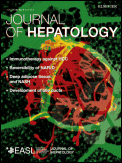
JOURNAL OF HEPATOLOGY
Charting New Territories in Liver Health ScienceJOURNAL OF HEPATOLOGY, published by Elsevier, stands as a preeminent source in the field of Hepatology, with its impact underscored by a remarkable 2023 Category Quartile of Q1 and a Scopus rank of 3rd out of 82 journals, placing it in the 96th percentile for the discipline. Since its inception in 1985, this journal has been a vital conduit for the dissemination of pioneering research, clinical studies, and reviews related to liver diseases and their impact on global health. Although it currently does not offer open access options, the journal is committed to providing top-tier content to its readership—researchers, medical professionals, and students—in order to advance knowledge and foster innovation in hepatology. With a broad and inclusive scope, it aims to cover significant breakthroughs, therapeutic advancements, and epidemiological studies, continually pushing the boundaries of understanding in liver health. The journal is based in Amsterdam, Netherlands, and remains an essential resource for those dedicated to the progression of hepatologic science.